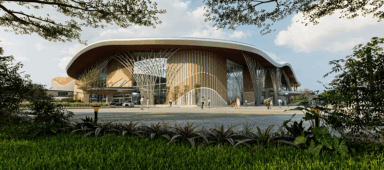Seven traditional dishes to share for the celebration
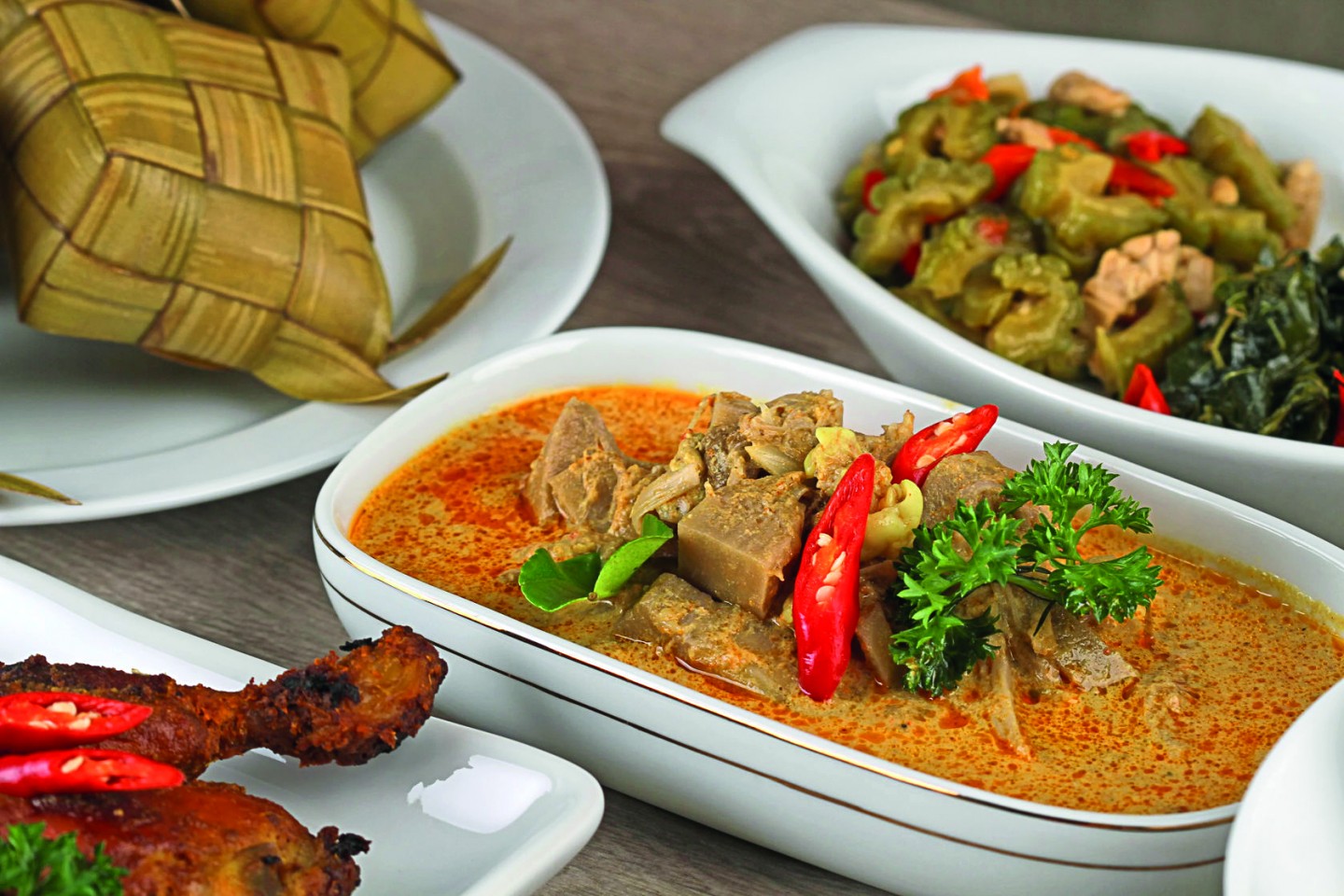
After a whole month of fasting, it’s only natural to assume that the Muslim festival of Eid is all about food. In truth though, the spirit of this meaningful time of the year rests in the reasons why it is celebrated.
Eid marks the end of the fasting month of Ramadan, the holy month that espouses restraint. It is about self-control and understanding the difficulties and sufferings of others. During this month, Muslims around the world not only abstain from food and drink from sunrise to sunset but they practise restraint in all aspects of their behaviour. Ramadan is a month of cleansing.
Ramadan, for me, is an intensely spiritual month. I see it as a time when I strive to better myself as a Muslim and a person. Therefore, when Eid arrives, we eat, celebrate and seek forgiveness so we can start anew.
It is an exciting time to catch up with family and friends. Thus, food is important; most families put a great deal of effort and thought into the dishes. This is particularly so for the first day of the Eid celebrations, when special dishes such as ketupat (diamond-shaped rice dumplings), lemang (dumplings made from glutinous rice and coconut milk), rendang (spicy meat), sambal goreng (a side dish of fried chilli and onion paste), serunding (spicy fried coconut flakes) and pineapple tarts are prepared using age-old family recipes.
Lemang
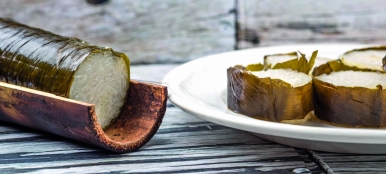
This is an all-time Eid favourite in Malaysia. Glutinous rice is cooked with coconut milk in a banana leaf-lined bamboo, making for a delicious treat. The filled bamboo tube is placed slightly slanted on a small fire with the opening facing upwards. It takes about four to five hours to cook lemang, while requiring regular turning to enable even cooking. Cooking on an open flame is what gives lemang its distinct smoky flavour with the hint of a grilled effect – tender and creamy on the inside and slightly crispy and crusted on the outside, with the aroma of the banana leaves’ natural essence permeating the rice.
Nasi Impit
Directly translated, nasi impit is compressed rice. Basically, it is rice cooked till very soft and pressed onto a baking pan. Another way to cook nasi impit is to place some rice in a bag that is sealed and boiled for several hours until the rice swells and the bag becomes compact. Due to the starch from the rice, the rice becomes firm yet tender when cooled. Nasi impit is normally cut into cubes and served with savoury fare.
Ketupat Palas
Steamed glutinous rice is folded into palm leaves that are weaved into triangle casings and boiled in thick coconut milk for a rich taste. The more unique version is the ketupat palas filled with glutinous rice and red kidney beans.
Rendang
Rendang is a well-loved dish throughout Malaysia. The basic rendang is made using lots of coconut milk, spices, galangal, lemongrass, shallots, ginger and kerisik (toasted grated coconut). Meats such as beef, chicken, lungs or liver can be used to make rendang. The tastiest rendang is cooked for long hours on a low flame, allowing all the ingredients to intertwine. Each state in Malaysia proudly boasts its own version of the rendang. The most well-known is the Rendang Tok Perak, in which every possible spice is used, followed by Rendang Negori, where coconut milk and cili padi play a major role in the rendang’s unique flavor.
Serunding
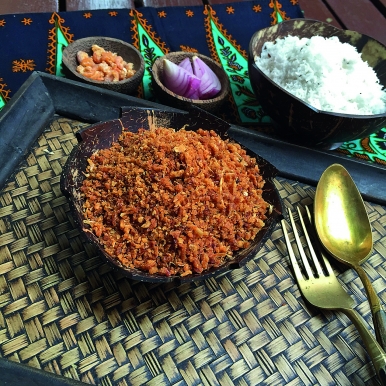
Serunding (meat pan-fried with grated coconut and spices till the texture becomes light and flaky) is a ‘must’ dish during Eid. Like the rendang family, serunding comes in many forms – beef, chicken, fish, prawns or coconut serunding. The intense effort and long hours put into making this dish is worth it as the result is an intensely flavourful condiment, perfect for eating with nasi impit, ketupat palas or lemang.
Lodeh
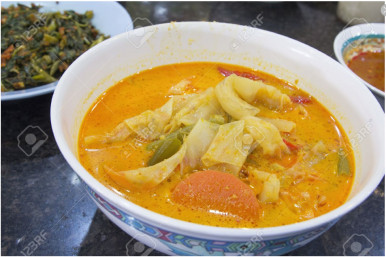
Lodeh is a specialty of southern Johor state, cooked and served primarily during the festive season. Unlike other ‘dry and meaty’ dishes, lodeh is a dish of many varieties of vegetables such as carrots, cabbage, white radish, long beans, aubergines, bean curd and rice vermicelli immersed in a coconut-based prawn soup. Quite a contrast to the typical Eid dishes, it is soothing and light. Ideal to be consumed with serunding or sambal over a heap of nasi impit cubes!
Pineapple tarts
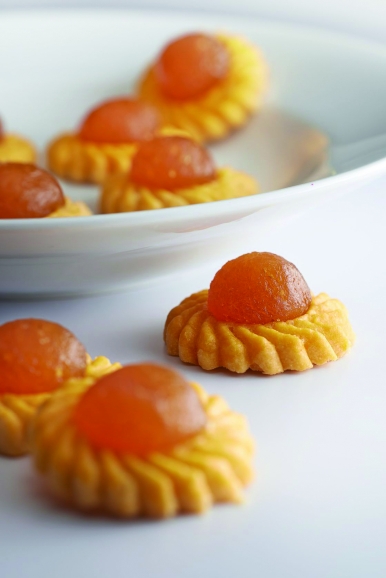
Pineapple tarts are a favourite Malaysian cookie with many variations. They are enjoyed during many festivities in Malaysia, including Eid. These are small, buttery and crumbly pastries filled with or topped with pineapple jam. My family makes our own pineapple jam from grated pineapples cooked on a low flame with sugar, pandan leaves, cloves and cardamom. Pastry made from a well-kept family recipe surrounds the thickened jam balls, and the tarts are shaped and baked till golden brown. The explosion of a lightly spiced jam when biting into the outer pastry makes it the perfect cookie for celebrating Eid.

